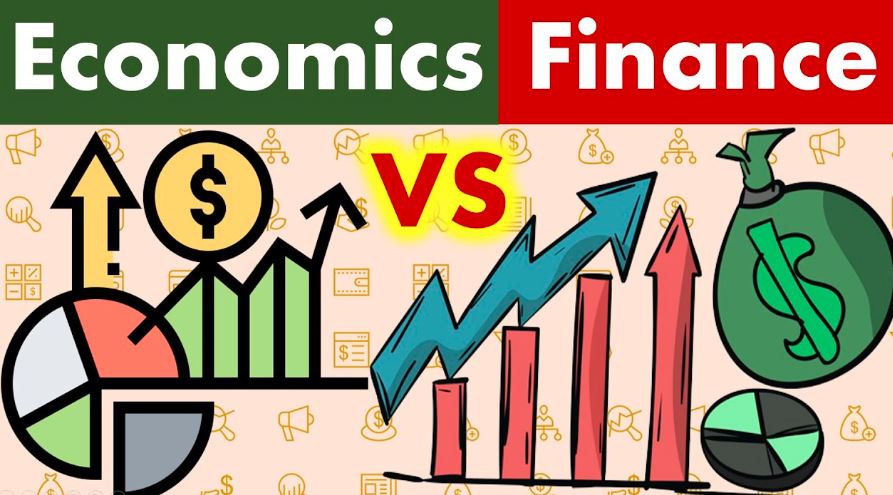Key Takeaways. Finance and Economics are two disciplines that are intertwined and mutually inform one another, despite the fact that their particulars are separate. The field of finance is a subfield of economics that focuses on analyzing many elements of the financial systems, including money, banking, credit, investments, and other related topics.
Finance and Economics –

Definition
Finance:

Scope: The administration, development, and analysis of monetary transactions, investments, and financial instruments are the primary focuses of the field of finance.
Focus: It emphasizes on the ways in which people, corporations, and governments manage resources, especially money, in order to maximize returns while minimizing risks.
Branches: Financial services, personal finance, corporate finance, and public finance are all included in this category.
Economics:

Scope: Economics, which is a more generalized branch of social science, investigates the ways in which people, businesses, and society come to judgments on the distribution of limited resources.
Focus: The creation, distribution, and consumption of commodities and services are all subjected to analytical scrutiny.
Branches: Individual and corporate conduct are the focus of microeconomics, whereas macroeconomics examines the economy as a whole.
Key Concepts
Finance:
Investment Analysis: Assessing the possibilities for investment in order to get maximum rewards.
Capital Markets: By gaining an understanding of the process of issuing and trading financial securities.
Risk Management: locating, assessing, and minimizing the impact of potential financial risks.
Corporate Finance: Managing the financial operations and capital structure of a firm via management.
Economics:
Public Policy: Evaluating government policies and their influence on economic wellbeing.
Inflation and Unemployment: Examining the factors that lead to shifts in employment and price levels, as well as the implications of such shifts.
Supply and Demand: Examining the procedure by which prices and quantities of products and services are established.
Economic Growth: The study of advances in an economy’s ability to generate products and services over short and long periods of time.
Analytical Approaches

Finance:
Valuation Methods: techniques such as the capital asset pricing model (CAPM) and discounted cash flow (DCF) are examples of some techniques.
Quantitative Analysis: Assessing the performance of the financial system and the risk involved by using mathematical models and statistics.
Economics:
Theoretical Models: For the purpose of explaining economic actions and predicting consequences, the creation of abstract models.
Empirical Analysis: This involves putting economic ideas to the test and using facts to guide policy choices.
Practical Applications

Finance:
- Developing strategies for asset allocation in order to optimize returns is an example of an investment strategy.
- Portfolio management is the process of managing a group of investments in order to accomplish monetary objectives.
- Providing advice on personal and commercial financial plans is what financial planning is all about.
Economics:
- The process of formulating policies involves providing advice on economic issues like taxes, trade, and welfare.
- Understanding the dynamics of the market as well as the actions of businesses and customers is what market analysis entails.
- The process of predicting future economic situations by analyzing existing patterns is referred to as economic forecasting.
Career Paths

Finance:
- Investment bankers are responsible for facilitating mergers and acquisitions as well as capital raising.
- A financial analyst is someone who interprets financial data and makes suggestions based on that information.
- The portfolio manager is responsible for managing investment portfolios for customers.
- Risk Managers are responsible for identifying and mitigating economic hazards.
Economics:
- Those who do study and analysis on economic topics are known as economists.
- Analysis of the effects of policies and laws is the responsibility of a policy analyst.
- For the purpose of guiding company choices, market research analysts study the circumstances of the market.
- Academic: Conducts research and offers instruction on various economic ideas and methods.
Related Questions…?

- How are global supply chain disruptions affecting economic growth in 2024 ?
Ans. As a result of declining investments and muted global trade dynamics, the United Nations Conference on Trade and Development (UNCTAD) has issued a warning that growth may slow down even more in 2024. There is a possibility that the fiscal outlook for governments and companies may improve if interest rates were lowered, but monetary policy cannot fix all of the urgent problems that are occurring throughout the world on its own.
2. How is the gig economy evolving in 2024 and what are its economic impacts ?
Ans. 2024 is a year in which the gig economy is continuing expanding. There is a wide variety of opportunities to earn money online. People with a variety of talents are now able to discover employment that is suitable for them thanks to websites and applications that are increasingly focusing on certain types of occupations. Gig workers now have an easier time finding employment and managing their work because to technological advancements.
3. What are the implications of 2024’s fiscal policies on personal and corporate finance ?
Ans. Interim Budget 2024: Direct Tax Proposals.
Following the implementation of the new tax system, taxpayers who have an income of up to seven lakh rupees would not be required to pay any taxes. Domestic enterprises that are already in operation will be subject to a corporation tax rate of 22%, while select new manufacturing companies will be subject to a tax rate of 15%.
4. How can investors use economic indicators to make informed decisions in 2024 ?
Ans. The significance of economic indicators cannot be overstated when it comes to enabling investors to make choices that are well-informed. Investors are able to acquire significant insights into the larger economic environment, develop the ability to foresee trends, and alter their investment strategy appropriately if they understand and follow these indicators.
5. How are changes in global economic policies affecting international financial markets in 2024 ?
Ans. As a result of declining investments and muted global trade dynamics, the United Nations Conference on Trade and Development (UNCTAD) has issued a warning that growth may slow down even more in 2024. There is a possibility that the fiscal outlook for governments and companies may improve if interest rates were lowered, but monetary policy cannot fix all of the urgent problems that are occurring throughout the world on its own.
See also:- Finance Types, Personal, Corporate, Public & more.

Hi, I’m Narinder Kumar, founder of BlogsBuz.com. I create articles and generate celebrity biographies, providing verified, up-to-date content. As an SEO expert and online tools creator, I also share practical tips on making money online, finance management, blogging, and passive income. My mission is to provide accurate information and keep you away from fake content, ensuring you stay well-informed and make smart decisions online.

